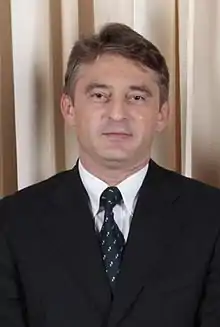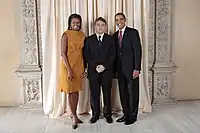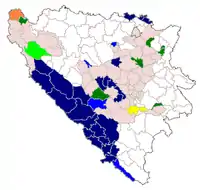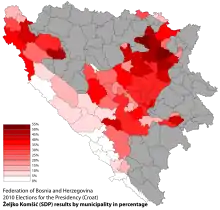Željko Komšić
Željko Komšić (Serbo-Croatian pronunciation: [ˈʒɛːʎkɔ ˈkɔmʃitɕ], born 20 January 1964) is a Bosnian politician and diplomat who is the 6th and current Croat member of the Presidency of Bosnia and Herzegovina. He served as the Presidency member already from 2006 until 2014, and he was elected to the same office for a third term in the 2018 election, thus becoming the second Presidency member overall (after Bosniak Alija Izetbegović) and the first, and so far only Croat member to serve more than two terms. He was sworn in on 20 November 2018, along with fellow newly elected presidency members Šefik Džaferović (Bosniak) and Milorad Dodik (Serb).
Željko Komšić | |
|---|---|
 | |
| 12th Chairman of the Presidency of Bosnia and Herzegovina | |
| In office 20 July 2019 – 20 March 2020 | |
| Preceded by | Milorad Dodik |
| Succeeded by | Šefik Džaferović |
| In office 10 July 2013 – 10 March 2014 | |
| Preceded by | Nebojša Radmanović |
| Succeeded by | Bakir Izetbegović |
| In office 10 July 2011 – 10 March 2012 | |
| Preceded by | Nebojša Radmanović |
| Succeeded by | Bakir Izetbegović |
| In office 6 July 2009 – 6 March 2010 | |
| Preceded by | Nebojša Radmanović |
| Succeeded by | Haris Silajdžić |
| In office 6 July 2007 – 6 March 2008 | |
| Preceded by | Nebojša Radmanović |
| Succeeded by | Haris Silajdžić |
| 6th Croat Member of the Presidency of Bosnia and Herzegovina | |
| Assumed office 20 November 2018 | |
| Prime Minister | Denis Zvizdić Zoran Tegeltija |
| Preceded by | Dragan Čović |
| In office 6 November 2006 – 17 November 2014 | |
| Prime Minister | Adnan Terzić Nikola Špirić Vjekoslav Bevanda |
| Preceded by | Ivo Miro Jović |
| Succeeded by | Dragan Čović |
| Member of the House of Representatives | |
| In office 9 December 2014 – 20 November 2018 | |
| President of the Democratic Front | |
| Assumed office 7 April 2013 | |
| Preceded by | Office established |
| Personal details | |
| Born | 20 January 1964 Sarajevo, SR Bosnia and Herzegovina, SFR Yugoslavia |
| Political party | Democratic Front (2013–present) |
| Other political affiliations | Social Democratic Party of Bosnia and Herzegovina (1997–2012) |
| Spouse(s) | Sabina Komšić (m. 1996) |
| Children | 1 |
| Residence | Sarajevo, Bosnia and Herzegovina |
| Education | Sarajevo III Gymnasium |
| Alma mater | University of Sarajevo (LL.B.) |
| Occupation | Politician, diplomat |
| Profession | Jurist |
| Awards | |
| Military service | |
| Allegiance | |
| Branch/service | Army of the Republic of Bosnia and Herzegovina |
| Years of service | 1992–1996 |
| Rank | Platoon leader |
| Unit |
|
| Battles/wars | Bosnian War |
Komšić was a prominent figure of the Social Democratic Party until he left it in 2012 to establish the Democratic Front a year later.
Although elected to the post of Croat member of the tri-partitive presidency, many Bosnian Croats considered him to be an illegitimate representative of their interests as he was elected mostly by Bosniak voters in the Federation,[1] a Bosniak-Croat political entity which forms a majority of the country's territory and whose residents are eligible to cast ballots for both the Bosniak and Croat members of the presidency (while the Serb member is elected by residents of the Republika Srpska entity).
Personal life and education
Komšić was born in Sarajevo to Bosnian Croat father Marko Komšić and Bosnian Serb mother Danica Stanić (1941 – 1 August 1992). His mother was killed by a sniper of the Army of Republika Srpska as she sipped coffee in her apartment during the Siege of Sarajevo.[2] According to many, this event was his breaking point, as at the time, he was enlisted in the Army of the Republic of Bosnia and Herzegovina. Komšić would go on to earn the Order of the Golden Lily, which was at the time the highest state order awarded for military merits.[3] His maternal grandfather Marijan Stanić, who was a Chetnik during World War II, died two years before Komšić was born.[4] The Stanić family hailed from the village of Kostajnica, near Doboj.[5] Komšić's paternal family hails from Kiseljak. His paternal uncle was an Ustasha who disappeared during World War II.[6] Komšić was baptised a Catholic, like his father. However, being a religious-skeptic, he left the Catholic Church. He is a self-described agnostic.[7]
Komšić has a Bachelor of Laws' degree from the Faculty of Law of University of Sarajevo. He was chosen to represent Bosnia and Herzegovina in selective annual Georgetown Leadership Seminar[8] in 2003.[9] His wife Sabina, is an ethnic Bosniak. The couple has a daughter named Lana.[10]
He was one of the signatories of the Declaration on the Common Language for Croats, Serbs, Bosniaks and Montenegrins.[11]
Komšić is an avid supporter of Sarajevo football club FK Željezničar, even having a membership card of the club as well, renewing it in July 2019.[12]
Bosnian war
During the Bosnian War, Komšić served in the Army of the Republic of Bosnia and Herzegovina and received the Golden Lily — the highest military decoration awarded by the Bosnian government.[13][14]
Early political career
After the war, Komšić embarked on a political career as a member of the Social Democratic Party of Bosnia and Herzegovina (SDP BiH). He was a councilman of the municipality of Novo Sarajevo and in the city council of Sarajevo, before being elected the head of the municipal government of Novo Sarajevo in 2000. He then also served as the deputy mayor of Sarajevo for two years. When the "Alliance for Democratic Change" coalition came to power in 1998, Komšić was named the ambassador to the now defunct FR Yugoslavia in Belgrade. He resigned this commission after the election in 2002 when SDP went back into opposition.
Presidency
First term (2006–2010)

Komšić was SDP's candidate for the Croat seat in the Presidency of Bosnia and Herzegovina in the 2006 Bosnian general election. He received 116,062 votes, or 39.6%[15] ahead of Ivo Miro Jović (HDZ; 26.1%), Božo Ljubić (HDZ 1990; 18.2%), Mladen Ivanković-Lijanović (NSRB; 8.5%), Zvonko Jurišić (HSP; 6.9%) and Irena Javor-Korjenić (0.7%).[15] He was sworn into office on 1 October 2006. His victory was widely attributed to a split in the HDZ-BiH party, enabling the SDP to win a majority of the Bosniaks votes. Croats see him as an illegitimate representative of the Bosnian Croats because he was elected mostly by Bosniak voters.[1]
In May 2008, the Bosniak Member of the Presidency at the time, Haris Silajdžić, stated during his visit to Washington, D. C. that there is only one language in Bosnia and Herzegovina and that it goes by three names. His statement created negative reactions from Croat political parties and, at the time, Prime Minister of Republika Srpska, Milorad Dodik. Komšić replied to Silajdžić that he is not the one who will decide how many languages are being spoken in Bosnia and Herzegovina.[16]
According to a study conducted by the National Democratic Institute in 2010, Komšić was the most popular politician among the Bosniaks.[17]
Second term (2010–2014)
.jpg.webp)
At the 2010 general election, Komšić won 337,065 votes, 60.6% of total. He was followed by Borjana Krišto (HDZ; 19.7%), Martin Raguž (HK; 10.8%), Jerko Ivanković-Lijanović (NSRB; 8.1%), Pero Galić (0.3%), Mile Kutle (0.2%) and Ferdo Galić (0.2%).[18]
Komšić's electoral win in 2010 is highly contested by Croat political representatives and generally seen as electoral fraud. Namely, every citizen in the Federation can decide whether to vote for a Bosniak or a Croat representative. However, since Bosniaks make up 70% of Federation's population and Croats only 22%, a candidate running to represent Croats in the Presidency can be effectively elected even without a majority among the Croat community - if enough Bosniak voters decide to vote on a Croat ballot. This happened in 2006 and in 2010, when Komšić, an ethnic Croat, backed by multiethnic the Social Democratic Party, won the elections with very few Croat votes.[19][20]


In 2010, he didn't win in a single municipality that had Croat-majority or plurality; nearly all of these went to Borjana Krišto. Bulk of the votes Komšić received came from predominantly Bosniak areas and he fared quite poorly in Croat municipalities, supported by less than 2,5% of the electorate in a number of municipalities in Western Herzegovina, such as Široki Brijeg, Ljubuški (0,8%), Čitluk, Posušje and Tomislavgrad, while not being able to gain not even 10% in a number of others.[21] Komšić received over seven thousand votes from the Bosniak-majority municipality Kalesija, where a total of 20 Croats live. Furthermore, total Croat population in whole of Federation of Bosnia and Herzegovina was then estimated around 495,000;[22]
Komšić received 336,961 votes alone, while all other Croat candidates won 230,000 votes altogether. Croats consider him to be an illegitimate representative and generally treat him as a second Bosniak member of the presidency.[23][24][25][26] This raised frustration among Croats, undermined their trust in federal institutions and empowered claims for their own entity or a federal unit.[27]
Return to Presidency; Third term (2018–present)
In the 2018 general election, Komšić was once again elected to the Presidency of Bosnia and Herzegovina as the Croat member with 52.64% of the votes, 16.5% more than his successor, presidency member Dragan Čović.[28] On 20 July 2019, he, for a record fifth time, became the new Presidency Chairman for the following eight months, succeeding Serb member Milorad Dodik.[29] After eight months, on 20 March 2020, Bosniak member Šefik Džaferović succeeded Komšić as Chairman for, as well, the next eight months.[30]
In December 2020, right before a state visit of Russian foreign minister Sergey Lavrov, Komšić refused to attend the visit because of Lavrov's disrespect to Bosnia and Herzegovina and decision to firstly visit only Bosnian Serb leader Milorad Dodik and later on the presidency consisting of Šefik Džaferović, Dodik and Komšić.[31] Shortly later, Džaferović too refused to attend Lavrov's visit because of the same reasons as Komšić.[32]
Orders
 Order of the Golden Lily 1st Class: 1995
Order of the Golden Lily 1st Class: 1995
References
- Citations
- Berglund 2013, p. 501.
- "In Little Bosnia, a gift from immigrants". St. Louis Today. 30 September 2013. Retrieved 27 March 2016.
- http://www.historija.ba/d/294-roden-zeljko-komsic/
- Simić, S. (15 November 2009). "Verovali ili ne: Četnički koreni zlatnog ljiljana?". Press Online. Retrieved 25 February 2015.
- "Hrvat Željko Komšić potomak četničkog vojvode". Telegraf. 20 August 2013. Retrieved 27 March 2016.
- Pušić, Mario (15 October 2018). "JUTARNJI U RODNOM MJESTU ŽELJKA KOMŠIĆA: 'MA NIJE ŽELJKO DOBAR ZA NAS, NIJE NIKAKO...' U Kiseljaku ga preziru, a čak je i njegova rodbina rezervirana". Jutarnji list (in Croatian). Retrieved 17 January 2021.
- https://translate.google.com/translate?hl=en&sl=bs&tl=en&u=https%3A%2F%2Fwww.oslobodjenje.ba%2Fvijesti%2Fregion%2Fko-je-komsic-pitaju-se-mediji-u-hrvatskoj-otac-marko-je-hrvat-majka-danica-bila-je-srpkinja-i-poginula-je-tokom-rata-u-sarajevu-zeljko-je-krsten-ali-se-izjasnjava-kao-agnostik-399597
- https://isd.georgetown.edu/georgetown-leadership-seminar
- https://gls.georgetown.edu/alumni/gls2003
- "Sabina Komsic".
- Derk, Denis (28 March 2017). "Donosi se Deklaracija o zajedničkom jeziku Hrvata, Srba, Bošnjaka i Crnogoraca" [A Declaration on the Common Language of Croats, Serbs, Bosniaks and Montenegrins is About to Appear] (in Serbo-Croatian). Zagreb: Večernji list. pp. 6–7. ISSN 0350-5006. Archived from the original on 23 May 2017. Retrieved 5 June 2017.
- K.H. (16 July 2019). "Član Predsjedništva BiH Željko Komšić obnovio članstvo u FK Željezničar" (in Bosnian). Klix.ba. Retrieved 16 July 2019.
- Željko Komšić - član predsjedništva BIH iz reda hrvatskog naroda - Biografija: Archived 27 January 2012 at the Wayback Machine
- Southeast European Times - ZeljkoKomsic - Member of the Presidency, Bosnia and Herzegovina
- "Opći izbori 2006 - potvrđeni rezultati: hrvatski član Predsjedništva" (in Bosnian). Central Election Committee of BiH. Retrieved 30 July 2012.
- "Komšić: U BiH se ne govori samo jedan jezik" (in Croatian). Klix. 26 May 2008. Retrieved 30 July 2012.
- "Najpopularniji Komšić, HDZ raste, pad SDA". Večernji list (in Croatian). 20 May 2010. Retrieved 3 June 2010.
- "Potvrđeni rezultati Općih izbora 2010. godine: Predsjedništvo BiH - Hrvatski član" (in Croatian). Central Election Committee of BiH. Retrieved 30 July 2012.
- Andrew MacDowall: "Dayton Ain’t Going Nowhere", Foreign Policy, 12 December 2015.
- "News Analysis: Few surprises expected in Bosnian general elections". Xinhua. 3 October 2010. Archived from the original on 6 October 2010.
- Central Electorate Commission, results in municipalities, 2010
- U BiH ima 48,4 posto Bošnjaka, 32,7 posto Srba i 14, 6 posto Hrvata (Article on the preliminary report of 2013 census) Archived 31 July 2014 at the Wayback Machine
- International Crisis Group: Bosnia’s Future Europe, Report N°232, 10 July 2014
- Vogel, T. K. (9 October 2006). "Bosnia: From the Killing Fields to the Ballot Box". The Globalist. Archived from the original on 10 October 2009. Retrieved 30 July 2012.
- Pavić, Snježana (8 October 2010). "Nije točno da Hrvati nisu glasali za Željka Komšića, u Grudama je dobio 124 glasa". Jutarnji list (in Croatian). Retrieved 6 April 2013.
- "Reforma Federacije uvod je u reformu izbornog procesa" (in Croatian). Dnevno. 13 May 2013. Archived from the original on 4 December 2013. Retrieved 13 May 2013.
- Luka Oreskovic: "Doing Away with Et Cetera", Foreign Policy. 30 October 2013
- Er. M. (8 October 2018). "CIK ponovo potvrdio: Džaferović, Dodik i Komšić novi članovi Predsjedništva BiH" (in Bosnian). Klix.ba. Retrieved 8 October 2018.
- "Dodiku "odzvonilo": Željko Komšić novi predsjedavajući Predsjedništva BiH" (in Bosnian). radiosarajevo.ba. 20 July 2019. Retrieved 20 July 2019.
- "Šefik Džaferović od danas predsjedavajući Predsjedništva BiH" (in Bosnian). n1info.com. 20 March 2020. Retrieved 20 March 2020.
- R.D. (15 December 2020). "Komšić: Lavrov je pokazao nepoštivanje države Bosne i Hercegovine" (in Bosnian). Klix.ba. Retrieved 15 December 2020.
- D. Be. (15 December 2020). "Džaferović: Želimo sačuvati ponos BiH, ovo je poruka i za Rusiju i za cijeli svijet" (in Bosnian). Klix.ba. Retrieved 15 December 2020.
- Bibliography
- Berglund, Sten (2013). The Handbook of Political Change in Eastern Europe. Cheltenham: Edward Elgar Publishing. ISBN 9781782545880.
External links
| Wikimedia Commons has media related to Željko Komšić. |
- Official web site of the Bosnia and Herzegovina Presidency (in Bosnian)
- Official web site of Željko Komšić (in Bosnian)
| Political offices | ||
|---|---|---|
| Preceded by Ivo Miro Jović |
Croat member of the Presidency of Bosnia and Herzegovina 2006–2014 |
Succeeded by Dragan Čović |
| Preceded by Dragan Čović |
Croat member of the Presidency of Bosnia and Herzegovina 2018–present |
Incumbent |